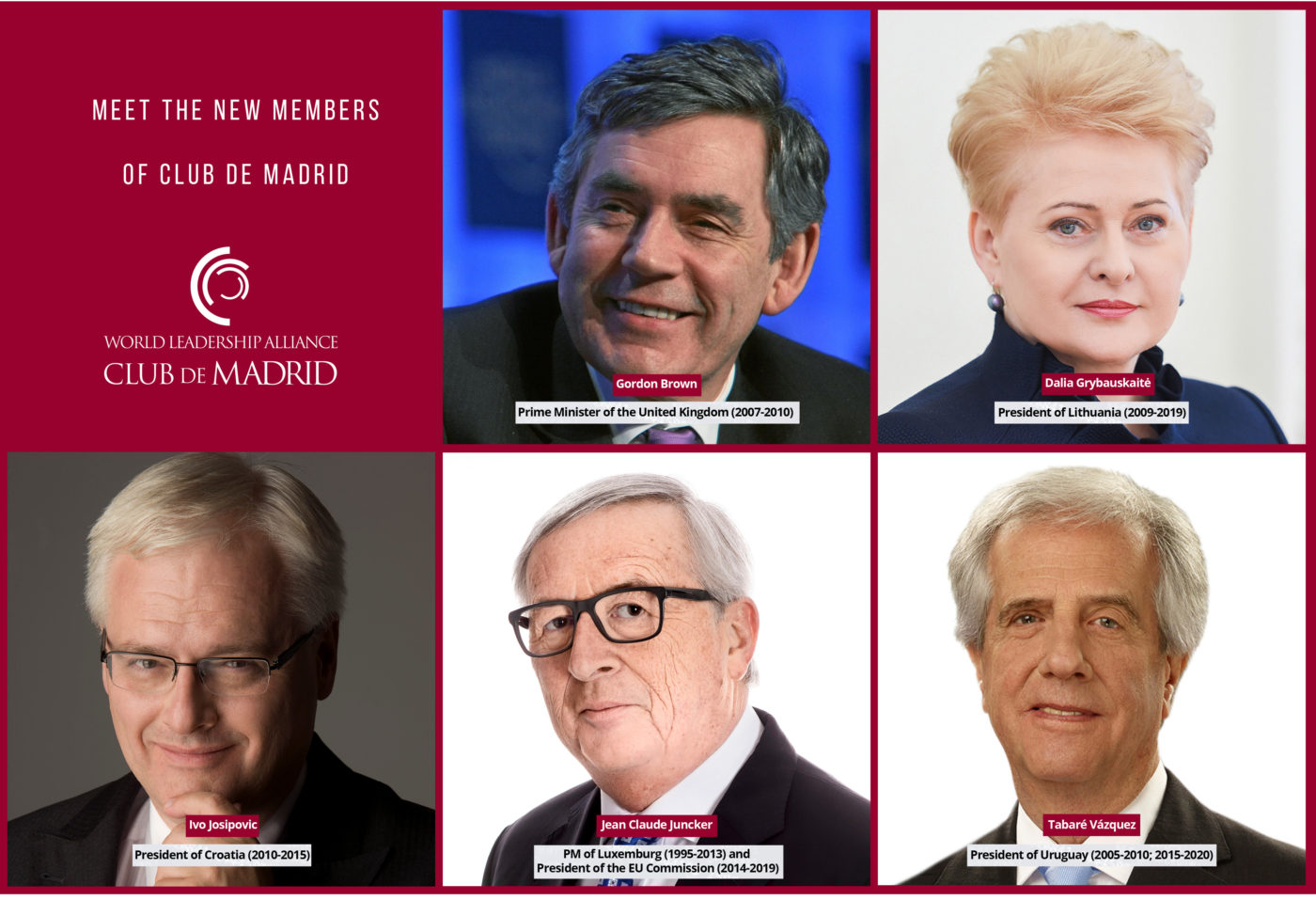World Leadership Alliance-Club de Madrid (WLA-CdM), the largest forum of former Heads of State and Government, added 5 new Members to an extensive list of leaders working to promote democratic values, good governance and the well being of people. The five new Members are the following:
• Gordon Brown, Prime Minister of the United Kingdom (2007-2010)
• Dalia Grybauskaite, President of Lithuania (2009-2019)
• Ivo Josipovic, President of Croatia (2010-2015)
• Jean Claude Juncker, Prime Minister of Luxembourg (1995-2013) and President of the European Commission (2014-2019)
• Tabaré Vázquez, President of Uruguay (2005-2010; 2015-2020)

Thanks to these five new additions, WLA-CdM’s Membership currently stands at 112 political leaders from 72 different countries working to promote democratic development and good governance worldwide.
The candidatures of these five new Members were ratified last 27 April 2020 in WLA-CdM’s General Assembly. Club de Madrid invites Members on a case-by-case basis, ensuring political, gender, geographical and cultural balance across all its Membership as a whole.
New Members bring experience in crisis management, public health, and democratic transitions
Gordon Brown became the Prime Minister of the United Kingdom in 2007 after serving as Chancellor of the Exchequer for ten years. At the helm of the United Kingdom, Brown was instrumental in devising a response to the 2008 financial crisis based on fiscal stimulus and the recapitalisation of the financial system. The G20 meeting he chaired in London in 2009 has been considered “the most successful in history” by the Brookings Institution, as it averted an extension of the Great Recession.
Throughout the ongoing COVID-19 pandemic, Member Gordon Brown has led a series of pleas addressed to the G20 in order to reach a similar agreement based on fiscal stimulus. Members of Club de Madrid have been supporting his pleas.
Jean Claude Juncker, became Prime Minister of Luxembourg in 1995 after years of serving as the Grand Duchy’s Finance Minister. Early on his premiership, Juncker was a staunch proponent of European integration, contributing to the Maastricht treaty and many other important agreements in the continent. In 2005 and until 2010, Jean Claude Juncker served as the first President of the Eurogroup, helping countries reach financial agreements to address the financial crisis.
After the European elections of 2014, Juncker became the President of the European Commission, a post he held until 2019. At the helm of the institution, Juncker played a significant role in key recent European events like the Greek crisis, the refugee wave and Brexit.
Dalia Grybauskaite was elected President of Lithuania after holding several high offices at her country’s Ministry of Foreign Affairs and served as Finance Minister for Algirdas Brazauskas government. Before becoming Lithuania’s Head of State, she served as European Commissioner for Education and Culture with Romano Prodi and European Commissioner for Financial Programing and Budget with José Manuel Barroso.
Dalia Grybauskaite was the first woman to become President of Lithuania. During her tenure, Grybauskaite steered Lithuania’s foreign action, playing a role in important world events like the Eurocrisis, Libya’s NATO-led operation, Ukraine’s separatist rebellion after the Euromaidan and, more recently, the Brexit negotiations. She continues to speak widely on women’s leadership, gender equality, sustainable development, economic transparency and accountability.
Ivo Josipovic is a Croatian jurist, politician, and composer who served as President of Croatia from 2010 to 2015. By authoring the statutes of Croatia’s modern Social Democratic Party, Josipovic played an important role in his country’s transition to democracy from communist rule. He is also a renowned professor of Criminal Procedure and International Criminal Law. He has authored many books and research papers on the topic.
After serving as Member of Parliament, he entered the race to become Croatia’s President, eventually making it to the runoff and securing the election in 2010. As Head of State of a former Yougoslav republic, Josipovic made a series of apologies regarding Croatia’s role in the Balkan Wars. The President personally apologised to Bosnia’s Muslim communities for crimes committed against them and to the country as a whole for attempting its partition during the wars. Similarly, Josipovic also apologised to Jewish communities in Israel for atrocities committed by Croatian militias during WWII.
Tabaré Vázquez is the former President of Uruguay and a doctor who has been recently named co-president of WHO’s Independent High-Level Commission on Noncommunicable Diseases. Prior to leading Uruguay’s executive, Vázquez held relevant governmental positions, both national and international, related to medicine.
After leading Montevideo’s regional administration, Vázquez served two non-consecutive terms as President of Uruguay (2005-2010; 2015-2020). His public health policies, particularly those against tobacco, have won several awards and made Uruguay’s public health policymaking stand out as an example in the region. Eleven universities have awarded him a Doctorate Honoris Causa.
